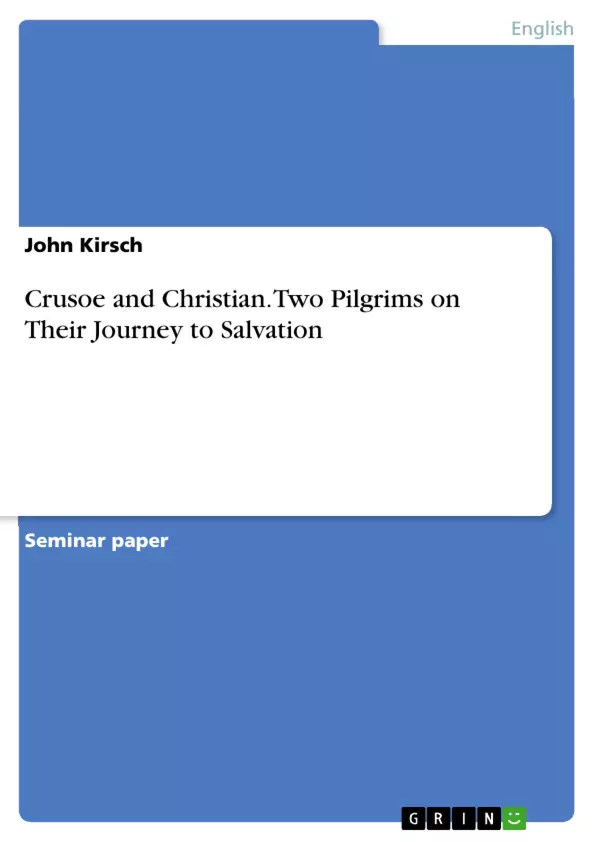Although released at a time, in which the downfall of English Puritanism was already conspicuous, I claim that by contrasting the protagonists of the two works, Daniel Defoe’s Robinson Crusoe definitely contains theological elements. These are founded in the old-fashioned Puritan belief depicting the spiritual journey of a reluctant pilgrim to God.
In validating this thesis, I will primarily work with the two aforementioned works and another publication of Daniel Defoe, as well as the King James Bible which most likely has been the translation that the two authors might have had at their disposal. Due to the fact that Daniel Defoe has been raised in a Presbyterian home, I am also going to consult the Institutes of the Christian Religion by the French reformer John Calvin and other secondary literature. For the confirmation of my above-mentioned claim, I will structure the term paper as follows: The first section, will feature the spiritual lives of Crusoe and Christian before their conversion. The second section will cover their conversion experience as such and the crucial role of God’s providence. The last section focusses concisely on the possible intention of Daniel Defoe. I will conclude this paper by summarizing the different outcomes supporting my thesis statement and by mentioning some potential research topics based on this paper.
Inhaltsverzeichnis (Table of Contents)
- Introduction
- Crusoe's and Christian's Lives as Wretched Pilgrims
- Crusoe's and Christians' Conversion Experience
- Daniel Defoe's Possible Intention
- Conclusion
Zielsetzung und Themenschwerpunkte (Objectives and Key Themes)
This term paper aims to explore the theological elements in Daniel Defoe’s Robinson Crusoe by contrasting the protagonists of the novel and John Bunyan’s The Pilgrim’s Progress. The paper investigates the spiritual journeys of the protagonists, analyzing their lives before and after their conversion experiences, with a focus on the concept of God's providence.
- The spiritual lives of Crusoe and Christian before their conversions
- The role of God's providence in their conversion experiences
- The possible theological intentions of Daniel Defoe in Robinson Crusoe
- The significance of the Bible and Puritan beliefs in shaping the protagonists' journeys
- The contrast between Crusoe's adventurous spirit and Christian's fear of impending judgment
Zusammenfassung der Kapitel (Chapter Summaries)
The first chapter introduces the protagonists, Robinson Crusoe and Christian, as characters struggling with their own sinfulness. It highlights Crusoe's adventurous spirit, which leads him to leave his family and embrace a life of seafaring, despite the warnings of his parents. Similarly, Christian is presented as a man burdened by the knowledge of his sins, seeking escape from the “city of destruction”. Both characters are portrayed as being “dead in trespasses and sins”, acknowledging their rebellion against God.
The second chapter delves into the conversion experiences of both Crusoe and Christian. It examines how both characters, through their individual journeys, come to recognize their need for God's grace and forgiveness. The chapter also explores the role of scripture in their spiritual transformations, highlighting how the Bible illuminates their past sins and guides them towards repentance.
Schlüsselwörter (Keywords)
This term paper focuses on the themes of conversion, God's providence, sin, and repentance. It explores the influence of Puritan beliefs and the Bible on the protagonists' journeys, examining the parallels and contrasts between Robinson Crusoe and The Pilgrim's Progress.
Frequently Asked Questions
What are the theological elements in Robinson Crusoe?
The novel reflects Puritan beliefs regarding the spiritual journey of a reluctant pilgrim towards God and salvation.
How does Crusoe compare to Christian in "The Pilgrim's Progress"?
Both characters are portrayed as sinners undergoing a transformation, though Crusoe's journey is framed by adventure and Christian's by a direct quest for the Celestial City.
What role does "Providence" play in Defoe's work?
God's providence is a central theme, guiding the protagonists through trials and leading them to their eventual conversion.
Did Daniel Defoe have a Presbyterian background?
Yes, Defoe was raised in a Presbyterian home, which significantly influenced the theological underpinnings of his writing.
What is the significance of the Bible in these novels?
The Bible (specifically the King James translation) serves as the ultimate guide for the protagonists' repentance and spiritual transformation.
- Citation du texte
- John Kirsch (Auteur), 2020, Crusoe and Christian. Two Pilgrims on Their Journey to Salvation, Munich, GRIN Verlag, https://www.grin.com/document/1060152



